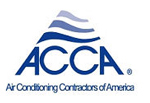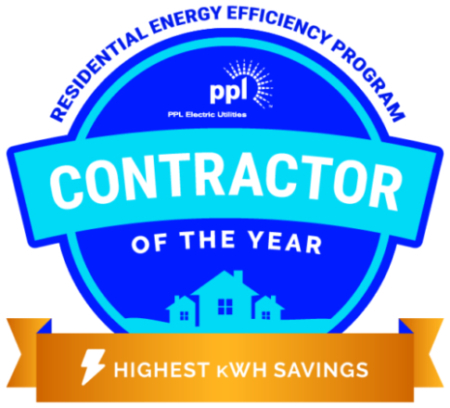Frequently Asked Questions
Electrical
Old fuse panels like push-o-matics along with Federal Pacific Electric Stab-lok, Zinsco, and Sylvania panels are not to code and should be replaced. This is because the breakers will not trip when they should and pose a fire risk due to arcing between the terminals.
The size of your generator is going to be dependent on your needs. If you want your house to be fully powered during an outage a 16Kw generator or larger should provide enough power to keep your house running. But if you need just the necessities or have specific medical needs you can use a 7Kw generator to operate a combination of a sump pump, refrigerator, garage doors, and some other dedicated outlets or devices.
General FAQ
According to Energy Star, a home in Central PA should have a total R-Value, or resistance to heat, between R-49 and R-60. This would equate to about 16.5″ to 20″ of total blown-in insulation.
HVAC
The musty smell in a basement is usually from mold or mildew growth because of higher humidity levels. Adding return air from an HVAC system is a good way to lower the humidity in the basement but ultimately a whole-house dehumidifier or dedicated system, like a ductless mini-split is the best way to keep your basement dry.
A Standard 1″ air filter should be changed at least every 3 months, even as soon as monthly during heavy use times and if there is a lot of activity from people or pets. Media air filters, usually 2″ – 4″ thick, will last longer, usually around 6 months, because of a bigger surface area. These can be changed annually in some cases. Learn more about air filters >>
The short answer – no, it shouldn’t be. Our duct cleanings consist of sealing each individual supply and return grille throughout the house. Then air-washing each line one at a time back to a commercial-grade, HEPA vacuum installed near the air handler or furnace. Finally sweeping the entire supply and return trunks to make certain all dirt and debris have been removed from the system. In a basic duct system, this process can easily take an entire day.
Manufacturing of residential cooling systems using freon or R-22 stopped in 2010 and the production of the refrigerant ended in 2020. This began in the 90’s because of the negative impacts of R-22 to our ozone. Being at least 10-years old most R-22 air conditioners or heat pumps are nearing or have already exceeded their average lifespan of 12-14 years. A diminishing supply of R-22 has also resulted in a dramatic price increase for freon refrigerant. As a result, making a major repair on an R-22 system is often not the best course of action.
Seasonal Energy Efficiency Ratio or SEER, is a way to measure an air conditioner or heat pumps performance during the cooling season. The minimum SEER in Pennsylvania is 13 for A/C and 14 for heat pumps. When considering replacing either, the SEER is only part of the equation, even those minimums will be an improvement on many systems over 10 years old. So, don’t get overly hung-up on a SEER rating, consider all of the other features and benefits and how a system will perform for you and your home.
An accurately sized air conditioner is critical to the performance of your system and the comfort of your home. A load calculation should be performed by a professional to determine the exact heating and cooling needs of your home. There is no real rule-of-thumb as it encompasses much more than just the square footage of the home.
HVAC systems have air filters to help keep them clean and air flowing properly. Filter sizes are determined by the size of the system and duct work. Commonly, air filters are 1” thick, then the filter is measured length by width. When choosing a filter to purchase, don’t get caught up in marketing ploys by filter manufacturers. Too dense of a filter will starve your system for return air. Stick with throw-away filters with a MERV rating of 8 or lower.
In the summer or cooling season, the upper vents should be open to return the rising hot air and keep cool air from falling. Conversely, in the winter the bottom vents should be open to pull hot air down and the cold air off of the floor.
If you find your air conditioner frozen in a block of ice, it’s best to immediately turn the system off and let it completely thaw before any additional damage occurs. There can be several reasons as to why this happens.
First, check that the system is collecting warm air from the house by confirming that return vents are clear and the air filter in the system is not clogged. Bigger issues include low refrigerant or an issue with the systems fan. Regardless, this is a clear indication of a problem and should be diagnosed by a professional right away.
A heat pump may look like it is smoking during the heating season but really it is steam as the system goes into a defrost-mode to remove frost from the coils. As long as you are not smelling smoke, this is normal operation for a heat pump in the winter.
Dust is usually generated by the activity in the home, the more people, pets, and movement throughout, the more dust. It also infiltrates the home via air leaks. Dust can also be introduced by loose or detached ductwork in attics, basements, and crawlspaces. It’s important to seal gaps around the home and ductwork. It is also important that ductwork is properly attached and in good condition.
This is a very common occurrence during the cooling season. Of course, heat naturally rises, but that’s not the primary culprit. A major contributing factor is the amount of heat that a second floor is gaining from the attic, many attics can reach 150° or higher in the summer. If an attic is under-insulated, this heat has no problem affecting the comfort of the second floor.
Second floors can also suffer from a lack of return air, while the system in the house pulls most of the warm air through the path of least resistance, i.e. the first floor, this results in hot air becoming trapped upstairs. Duct design and thermostat location also play major roles in temperature differences. Adjusting balance dampers can be a way to force more cool air to the second floor.
Plumbing
The simple answer is – No. Nothing should be flushed down your toilet aside from waste and toilet paper. Toilet paper is specifically designed to break down quickly in water.
Hard water is not necessarily bad for you to drink but it can have adverse effects on hair and skin. Otherwise, it is harmful to your home’s plumbing and any water-using appliances, resulting in a decrease in their efficiency and useful life.
The most common type of water heaters are storage tank water heaters and are typically either electric or gas-fueled. Most water heater sizes are around 40, 50, or 80 gallons. A 50-gallon water heater is fairly standard. But with a family of 5 or more and/or high water heating demands like a jacuzzi tub, going with a larger capacity will be best. Due to energy standards, electric water heaters larger than 55 gallons are required to meet a specific Energy Factor (EF) rating and will most likely need to be a heat pump water heater, fortunately, these are very efficient.
Gas fueled water heaters tend to have a much better First Hour Rating (FHR) and recovery rate to provide better performance. Where often a 50-gallon gas water heater will perform more closely to that of an 80-gallon electric and will satisfy the needs of most typical households.
Most water shut-offs are located in the basement near the water meter where your city water enters your home from the street. Some may be located in a crawl-space or utility closet. If your home utilizes well water, the shut-off should be near your well pump and tank. Be sure to locate the shut-off in your and test the operation periodically so you know it’s ready to work when you need it to.
Just like all the appliances in your home, a garbage disposal needs regular maintenance. An easy way to clean it and have it smelling fresh is to run cold water into it, turn it on and put in a whole lemon cut in half along with a bunch of ice cubes. Another good cleaning method is to use a tray of frozen vinegar cubes with cold water to run through the system. Do not use chemicals in the garbage disposal, these will damage the system.









